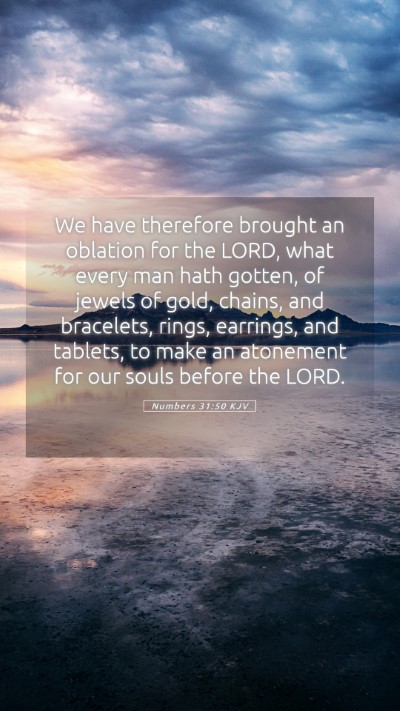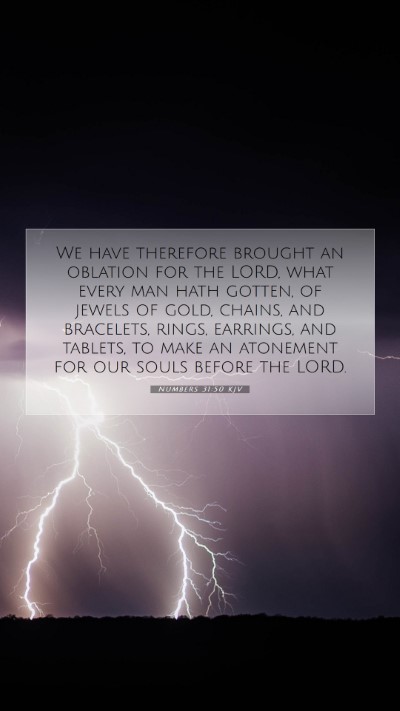Bible Verse Meaning of Numbers 31:50
In exploring the meaning of Bible verses, particularly Numbers 31:50, we uncover profound insights that illustrate the significance of offerings made to God, the attitude of gratitude, and the importance of acknowledging the sacred in our lives.
Verse Context
The verse reads as follows: "We have brought an offering for the Lord, what every man found of ornaments of gold, chains, and bracelets, rings, earrings, and tablets, to make an atonement for our souls before the Lord." (Numbers 31:50, KJV). This passage comes after Israel's campaign against the Midianites, indicating a moment of reflection and recognition of God’s hand in their victory.
Commentary Insights
Commentaries like those by Matthew Henry, Albert Barnes, and Adam Clarke provide a rich tapestry of understanding regarding this verse:
-
Matthew Henry's Commentary:
Henry emphasizes the importance of the offerings, highlighting that they were not just material gifts but a sign of acknowledgment towards God’s mercy and provision. The Israelites' offerings were prompted by a sense of duty and thanksgiving for the spoils of war.
-
Albert Barnes' Notes:
Barnes interprets the verse as highlighting the necessity of atonement and making reparations for sin, suggesting that the offerings were a way to overshadow the deaths and devastation that preceded this moment. The gold and ornaments had been earned through conflict, yet it was vital to dedicate part of it back to God.
-
Adam Clarke’s Commentary:
Clarke points to the underlying principle that all possessions ultimately belong to God, and as such, one should willingly share a portion as an offering. His analysis suggests that this act represents human acknowledgment of divine sovereignty and the necessity of purification through atonement.
Theological Implications
The theological implications drawn from this verse emphasize several key concepts in biblical exegesis:
- Recognition of God’s Sovereignty: The act of giving back is a profound statement acknowledging that all that we possess is derived from God’s hand.
- Principle of Atonement: The focus on atonement reflects the continued need for humanity to seek reconciliation with God, a theme prevalent throughout Scripture.
- Gratitude in Worship: The response to God’s blessings through offerings denotes a heart of gratitude that should characterize the life of a believer.
Application to Daily Life
Understanding this verse can guide individuals in their Bible study lessons. Here are ways to apply the insights:
- Stewardship: Just as the Israelites offered their treasures, believers today are called to practice stewardship of their resources, recognizing their ultimate source.
- Intentional Thankfulness: Incorporating moments of thankfulness for both spiritual and material blessings in daily prayers or family discussions can greatly enhance one’s spiritual life.
- Community Worship: Engaging in acts of service and generosity within community settings reflects the spirit of this verse, fulfilling the call to bring offerings to the Lord.
Further Study and Reflection
For those engaged in online Bible study or Bible study groups, this verse provides a rich topic for deeper exploration. Here are suggested areas for reflection:
- What does true thankfulness look like in the context of our modern resources?
- How can we ensure that our spiritual practices include recognition of God’s past provisions?
- What does this verse tell us about the relationship between Israel and God during their journey through the wilderness?
Cross References
Numbers 31:50 resonates with several passages throughout Scripture, providing a fuller understanding:
- Exodus 22:29-30: The duty to consecrate offerings to the Lord.
- Leviticus 27:30: A reminder that a tithe of all things belongs to God.
- Deuteronomy 16:10: A directive on how to celebrate God's blessings and provide offerings.
Conclusion
Numbers 31:50 offers rich insights into Bible verse meanings and serves as a reminder of the continual need to offer back to God in gratitude for His goodness. By engaging with the commentaries and applying their teachings, believers can deepen their Bible verse understanding and cultivate a life characterized by thankfulness and recognition of God's graciousness.


